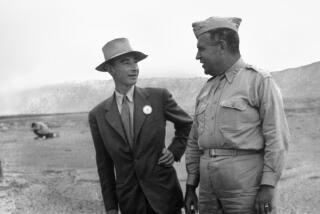BOOK REVIEW : The Nurturing of a Mathematics Genius : JOHN VON NEUMANN: The Scientific Genius Who Pioneered the Modern Computer, Game Theory, and Nuclear Deterrence, <i> by Norman Macrae,</i> Pantheon Books, $25; 334 pages
- Share via
“Genius” is one of our most overused labels, so when someone who truly deserves the designation comes along, he or she may get lost in the brouhaha. A case in point is John von Neumann, a Hungarian-born mathematician who profoundly influenced U.S. science, technology and foreign policy until his death, at 56, in 1957.
For all his well-earned recognition in his own time, von Neumann is all but unknown today. The reason, suggests Norman Macrae, author of “John von Neumann,” an absorbing--if sometimes annoying--biography, is that the mathematician spread himself too thin to leave an indelible mark. Von Neumann was interested in everything around him, and his chief talent lay in radically improving other people’s ideas.
Von Neumann’s unusual life would be impossible to replicate now, and to grasp its significance, the reader needs the help of a historian blessed equally with academic savvy and international street smarts. Macrae finds numerous ways to remind the reader that he has both, having taken an honors degree in economics from Oxford University and having spent his working life with the prestigious British weekly the Economist.
Amid the self-promotion, Macrae supplies important context for von Neumann’s otherwise puzzling ascent to the highest U.S. government circles. The author points out, for example, that von Neumann was only one of a seemingly inordinate number of brilliant Hungarian refugees to move to the United States in the 1930s.
Most members of the stratospheric-I.Q. inner circle of the Manhattan Project, which produced the A-Bomb and H-Bomb, had graduated within a few years of each other from one of Budapest’s three best preparatory schools. These “men from Mars,” as an envious U.S.-born scientist dubbed them, were Edward Teller, Leo Szilard, Eugene Wigner and von Neumann. The last two, in fact, were friends from childhood.
At 10, “Johnny,” as Macrae chummily refers to von Neumann throughout the book, taught the 11-year-old Wigner set theory, a high-level branch of mathematics.
Turn-of-the-century Budapest could hardly help producing such prodigies, Macrae says, owing to its unique mix of old and new cultures. Despite its remarkable success as a commercial power, Hungary was one of the last European nations to relinquish feudalism. Even at the turn of the 20th Century, its native Magyar population was almost entirely peasant class, lorded over by a few aristocrats who disdained the hurly-burly of business and the professions.
Thus, medicine, law, the arts--and especially the socially declasse study of science and mathematics--were wide open to non-native Hungarians who earned their qualifications in Budapest’s excellent schools. Not surprisingly, says Macrae, education-hungry, entrepreneurial people, many of them Jews, flocked from all over eastern and western Europe to booming Budapest--then fled to the United States when Hitler came to power.
Von Neumann, the cosseted son of a successful international banker, grew up in Budapest at the peak of the city’s opulence. His father, a non-practicing Jew, earned the family an aristocratic title in return for commercial service to the nation (hence the “von”). The elder von Neumann saw to it that little Johnny was surrounded with extra-bright governesses who spoke the major European languages. On graduating from high school, the young von Neumann won Hungary’s top scholastic honor, as had Nobelist-to-be Eugene Wigner the year before him.
In 1933, already internationally renowned as a mathematician at age 29, von Neumann followed Einstein in accepting a tenured position at the brand-new Institute for Advanced Study in Princeton. Then, using his grand Princeton home as a base, von Neumann spent the rest of his life using his social and mathematical skills to work his way into increasingly influential positions in academia, government and industry.
He was, unlike his reclusive, other-worldly colleague, Einstein, a practical man, always looking for ways to apply his formidable mind to problems of daily life.
If von Neumann’s singularly rich and productive intellectual life offers a lesson to parents of a gifted child, it is this: Thinking should never cease to be fun. Macrae’s treatment of von Neumann is partly obscured by hero worship. Nevertheless, Macrae’s life of the great mathematician shows dramatically what proper care and feeding can do for an unusually capacious mind.
More to Read
Sign up for our Book Club newsletter
Get the latest news, events and more from the Los Angeles Times Book Club, and help us get L.A. reading and talking.
You may occasionally receive promotional content from the Los Angeles Times.










